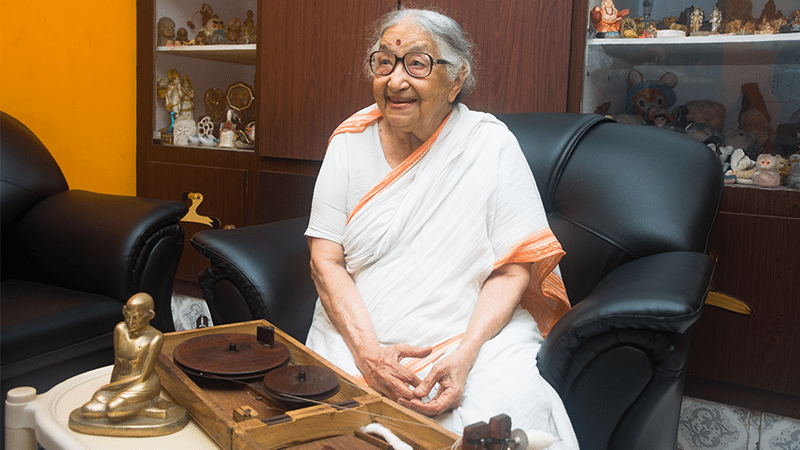

She was a highly respected lawyer with a marked difference – she strongly believed in and practices the Gandhian way of life even today. Yo! Vizag interacted with the ardent Gandhian Saraswati Devi earlier and discovered a little bit about Vizag during the struggle for independent India.
She was born into and eventually wedded to the quintessential Gandhian thoughts, words and deeds; both literally and figuratively. Saraswati was married during her teens into Vizag’s famous Digumarti family during the Indian National Movement. It was a glorious marriage-alliance between two like-minded nationalistic families. Gadicherla Ramamurty, her father, was a very renowned Gandhian in Rajahmundry and Digumarti Ramaswamy, the paternal uncle and guardian of Dr. Gopala Swamy, whom she married, was a renowned Gandhian, freedom fighter and Congress legislator from Vizag before independence. Dr. Gopalaswamy himself was an ardent Gandhian, who studied medicine in Kakinada, did his Masters in the USA and practiced in Vizag. He also served philanthropically in the Gandhi ashram in Gujarat; no wonder that her Gandhian tutelage found a perfect match in her husband.
According to her, she belongs to that generation of women who spanned the transition phase from traditional conservative to educated and liberated. She completed her BA in Rajahmundry and post marriage, settled in Vizag in the early 1940s. A few years later, after giving birth to three children, she opted to study Law in Andhra University – it was considered a revolutionary step for women of that era, she says. After graduating in Law, there was no looking back for her as she earned a distinguished name for herself practicing Criminal law for almost seven decades in the District Sessions Court of Visakhapatnam. Being a Gandhian whole her life, she mostly did serve the downtrodden and needy. She says that the police force, contrary to popular perception and belief, used to be very cordial.
Recollecting the historic moment when India gained independence from British yoke, her face lit up with nostalgia as she proudly recollected how she, along with a group of jubilant nationalists and other citizens ran from their homes in Maharanipeta towards the Collector’s office. They climbed up the spiral staircase by hopping in the circular turret attached to its porch to reach to the top and lowered the Union-Jack gleefully. They then raised the Indian National Flag triumphantly at the stroke of midnight. Recalling that joyous moment, she also fondly recounted the two occasions that she had met Mahatma Gandhi in her childhood when he had toured this part of land during Indian National Movement. The most memorable one involved her direct interaction, laced with childlike innocence, with the Mahatma. As per the then prevalent practice of selflessly offering valuable ornaments for the cause of national struggle, she removed and handed over her gold bangles in one of the public meetings presided over by him. With the innocence and recalcitrance associated with a child, she demanded he give her something in return. When she remained adamant on her demand even though he expressed that he didn’t have anything to offer her, he laughingly and lovingly gave her a tiny spindle with the yarn that he spun. That spindle along with yarn spun almost eight decades ago by the Mahatma is her prized possession to this date.
It is very heartening to note, that unlike rhetorical preachers, she walks the talk; even today, she spins yarn from cotton fibre daily using her table-mounted spinning-wheel set-up. She gets cloth made out of yarn and prepares hand-kerchiefs, and small items that she presents to her friends, relatives, especially to her grand-children and great grand-children.
Advocating the Gandhian way of living, she says the only answer to all the ills of the commercialised greediness that is prevalent presently is simple to preach, but hard to practice: eschew the greed and embrace the simple way of moralistic living while taking care of basic needs. She laments that the service oriented nature that was prevailing during our national movement and earlier decades of Independent India is fast disappearing in society at large. She recounted how selflessly people came forward and helped her when she decided to start a school for servant maids during those days.
Saraswati is very fond of the Beach Road. When she first came to Vizag, the beach-sands were vast, wide, expansive and long. Her children would go deep into the waters as much as up to Teerthapu raallu, the large boulders seen in waters from Ramakrishna Beach, to play. Vizag’s long coastline along with an expansive sandy beach with rocky portions, she says, has always had a magnetic pull. Its vastness in size, regal appearance, and rhythmic roar amidst sylvan surroundings especially at Rushikonda area casts a majestic spell. Vizag had been a simple town till the 90’s: uncongested roads, small shops, simple houses, laidback and lackadaisical life-style used to dot the city as well as people’s life; even people’s psyche used to be without any congestion; ambition and greed were very rare to find among the general public. The 90s, she says, brought in a sea-change both in the physical world and the life-style. The economic reforms brought in many opportunities for growth; but attached with the positive results of this growth, the by-products of a dubious nature too have manifested; in fact, they are more abundant and visible, she avers.
She affectionately remembered the joint-family days in the bygone period. Their home had been one, with almost twenty members belonging to families of siblings and their children living under a single roof. She says the advantages of such a setup far outweigh the drawbacks, if any; it offers a wonderful support-system for all emotional needs of a family. Her advice is that as far as possible, people could consider revisiting that setup, and abandon the pervasive nuclear-family trend.
And while there have been changes in society, there is not much change in so far as society’s attitude towards working-women is concerned, she says. The fact that there are more working women now compared to the past is a result of women’s self-awareness rather than of society’s open-arm welcome. She attributes the success of women in professional and artistic fields to the proliferation of education and opportunities. In fact, she did contribute her efforts there too, as she was one of the important citizens of Vizag who strove hard and succeeded in establishing the first exclusive Women’s college in the city.
The old world charm, the sagely visage, the geniality in appearance and especially the grit and gumption in her words, which are the outcome of many decades of glorious public service discharged in an impeccable Gandhian spirit make her a person, cut above the rest. If we follow her in true letter and spirit even to a fraction of what she did, we would be able to make a difference for better to society in general and ourselves in particular.
Note : Published on print - Mar'2015. This article is a repost. Sri Saraswati Devi passed away on May 28, 2018.
This post was last modified on 04/06/2018 4:37 pm
There have been many OTT releases worldwide this week. When there are limitless entertainment options,…
With schools on break and the sun shining bright, summer is the perfect time to…
For most Vizagites, a trip to Araku Valley is a cherished escape. With its cool…
There's just so much time, but it is never enough to decide what to eat.…
Fourteen years after its original release, Mahesh Babu’s cult classic Khaleja is all set to…
Many people assume that one type of insurance is enough — either health insurance to…
Leave a Comment